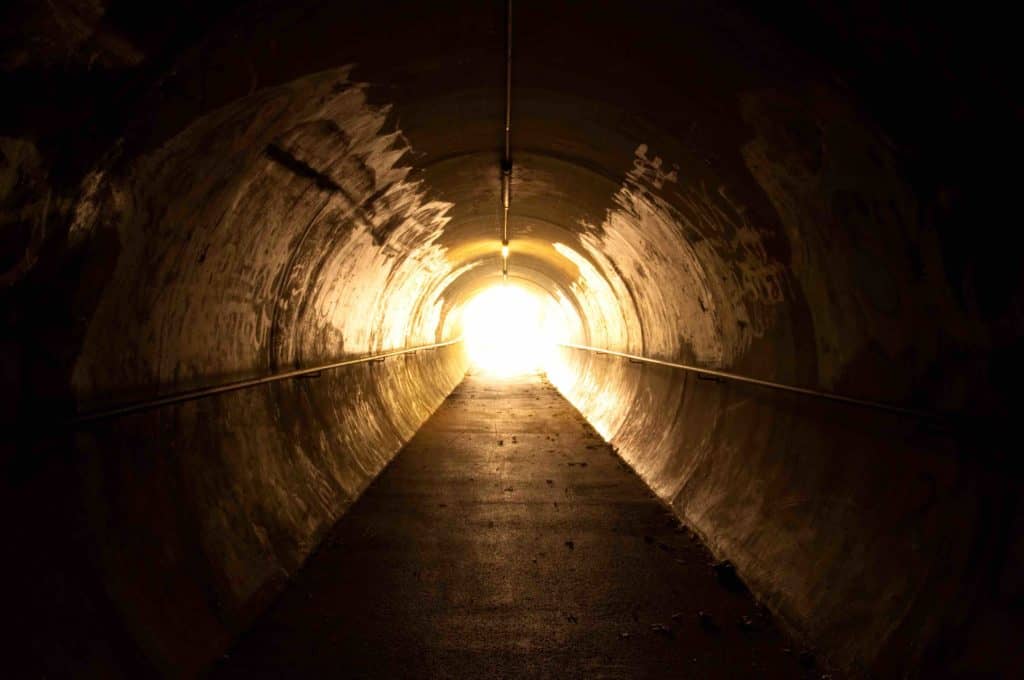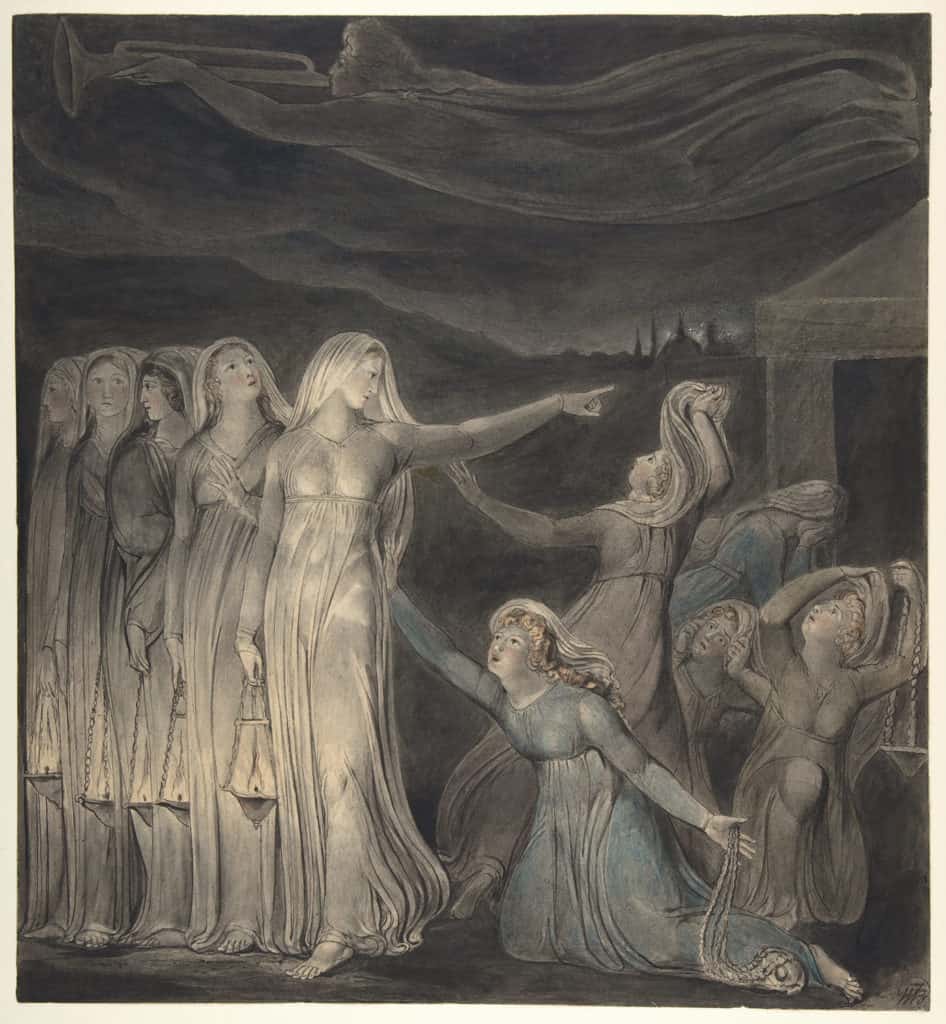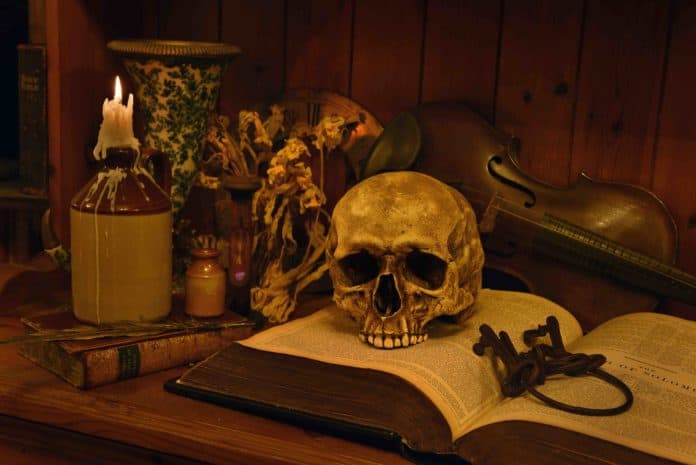We are all in the same boat. We are moving down a river. At the end of the river is a waterfall. The boat keeps moving closer and closer to the fall. Knowing that this is the case there is nothing we can do. We must all take the plunge into the unknown abyss we call death.
Let us imagine a number of men in chains, and all condemned to death, where some are killed each day in the sight of the others, and those who remain see their own fate in that of their fellows, and wait their turn, looking at each other sorrowfully and without hope.
It is an image of the condition of men.
-Blaise Pascal
This is life in a nutshell.
Ancient Rome
This thought is not original nor is it new. The words momento mori, meaning “remember, you will die,” is believed to have originated in Ancient Rome. After a triumphant battle, a general would parade through the streets of Rome to the cheers and shouts of the adoring crowd. All the while, the general’s slave would whisper words into the general’s ear such as “momento mori,” reminding the general that he is but a mere mortal and will one day die.
Today it seems as if we try to do everything to forget that fact. It is like we are walking out onto thin ice whistling a happy tune. Why was it important for the generals of the past to remember they will die and why do we seem to take the opposite approach?
The Plight of Modernity
People nowadays have turned inward on themselves. Since the self-help movement in the 60s and 70s there has been a movement towards more and more narcissistic tendencies. Now that social media has taken hold of our lives, the downward spiral into the self has grown into a downward spiraling labyrinth.
This has a myriad of ramifications both socially and individually but let us focus on just a few for the time being.
Firstly, as a person becomes more and more turned in on his or herself that person has a tendency to think they do not need anyone else. This results in anti-social tendencies, lack of empathy, entitlement, vanity, materialism, and other generally negative individual traits. Secondly, a person becomes more and more enthralled with his or her own thinking. This results in mistrust of established norms, disrespect for authority, relativism, decrease in shared values, indifferentism, secularism, anarchism, and other generally negative social ideas. One can imagine how both the individual and social aspects overlap, intersect and interact.
But Wait…
Now, this is not to say that all that modernity has to offer is bad. Let us not throw the baby out with the bathwater. However, the present trajectory should cause one to pause, to reflect on the current state of affairs and perhaps not just blindly accept the idea that we are always headed in the right direction as time progresses. It should also cause one to reflect on whether “progress for progress’ sake” is always good.
Me, Me, Me.

So wait… what does all this talk about narcissism have to do with death? The problem we have when we turn inwards is we get lost in our own small worlds. We forget about the bigger picture. Momento mori was spoken to the general to remind him of what? That he will be become nothing, in the grand scheme of things, despite all of his accomplishments.
We too will become nothing. We will die. All your possessions… gone. The money in your bank account, it might as well be zero. All of those “likes” and “shares” on social media… worthless. Your legacy? It will eventually be a torn out page in the story of this world.
Will there be any of “you” left? On a long enough timeline, no. The sun will die out, humanity will be gone and all of our collective accomplishments will ultimately amount to nothing.
Hope
There are only two possibilities for what happens when we die. We either go somewhere or we go nowhere. There is no in-between.
For those that say death is the final word and nothing happens, your story ends right before the word “Hope” above. It is bleak for you. Life is ultimately meaninglessly and dismal, dark, despairing (words really cannot describe the horror of such an outlook).
For those that say death is not the final word, a question still remains… where do we go when we die?
The Afterlife

Most people who believe in some form of life after death believe people either go to heaven, hell, purgatory or limbo, some other plane of existence, or are reincarnated. Another plane of existence could be another dimension, another world, or the like. Although much more can be said (an understatement), for the purposes of this article, let’s leave it at that for now.
Near-Death Experiences
Evidence of an afterlife has been found in near-death experiences (NDEs). In fact, many studies have been performed on near-death experiences and there is even an International Association for Near-Death Studies. In a famous study by Lommel et al., it was determined that “medical factors cannot account for occurrence of NDE.”
A list of the most credible studies includes:
- Lancet Study on NDEs
- South Hampton University Study, Samuel Pernia, M.D. et al
- NDEs and the Blind, Kenneth Ring, PhD and Sharon Cooper, MA
- Research by Janice Holden, EdD
- Studies from the Journal of Near-Death Studies
These studies are serious. They are not done by some flight-by-night institutions. They are also published in notable peer-reviewed scientific journals. And to be considered in these studies as a near-death experience candidate you must have had a flat EEG (electroencephalogram), which indicates absence of electrical activity in the cerebral cortex. You cannot have a gag reflex. Also, your pupils must be fixed and dilated.
Why is this significant? Well, in this state, sensory organs are not functional. This means that the sensory organs themselves simply do not work. Also, the brain is not capable of processing any signals. This means that thinking and memory processing is absent.
This is astonishing given the fact that near-death patients have these experiences, aka the experiences we are saying are not possible, scientifically speaking.
Findings of Near-Death Studies
With the large amount of research now available on near-death experiences some general findings and statistics can be found on these experiences.
Researchers studying near-death experiences have found:
- 85% of people leave their bodies
- People can see and hear things while dead
- People can move about freely and voluntarily
- People can report veridical data (aka things that occurred while they were dead)
- 80% of blind people can see while they are dead (even those blind since birth)
- Large percentage of people see relatives, a bright white loving light, Jesus or God
Remember, You Will Die
Thinking about death puts your life into perspective. It makes you think about the choices you are making in this life that you have right now. It helps you to figure out whether or not you are on the right trajectory. It makes you ask the tough questions like, “How do I want to be remembered?”
Thinking about death also puts the things that you currently value into perspective. Do you value possessions and material wealth, or do you value the people around you? Do you value others or do you only value yourself? Do you value power, honor, success, or do you value peace, justice and equality? And what do you do with the things you own, do you share them wisely, or do you hold onto them selfishly or squander them?
Thinking about death can really change your life. Do not obsess over death and fear death to the point where you cannot live a normal life. You cannot change the fact that death will happen and trying to avoid it will only prevent you from living your life, which in that case you might as well be dead.
Living A Good Life
Socrates believed that living a “good life” was to live a virtuous life. As a Catholic, my personal belief is not too much different in the general sense. However, the major difference between a virtuous life for a Catholic and the one Socrates envisioned is that the Catholic life should be a virtuous life centered around Jesus Christ.
Furthermore, Catholics believe that people should live in accordance with the Ten Commandments and by the Great Commandment given by Jesus Himself: “Thou shalt love the Lord thy God with all thy heart, and with all thy soul, and with all thy mind” and “Thou shalt love thy neighbour as thyself.”
The Wise and Foolish Virgins

Often when I think about death I think about The Parable of the Wise and Foolish Virgins.
The Parable of the Wise and Foolish Virgins
Then the kingdom of heaven will be like ten virgins who took their lamps and went out to meet the bridegroom.
Five of them were foolish and five were wise.
The foolish ones, when taking their lamps, brought no oil with them, but the wise brought flasks of oil with their lamps.
Since the bridegroom was long delayed, they all became drowsy and fell asleep.
At midnight, there was a cry,
‘Behold, the bridegroom! Come out to meet him!’
Then all those virgins got up and trimmed their lamps.
The foolish ones said to the wise,
‘Give us some of your oil, for our lamps are going out.’
But the wise ones replied,
‘No, for there may not be enough for us and you. Go instead to the merchants and buy some for yourselves.’
While they went off to buy it, the bridegroom came and those who were ready went into the wedding feast with him.
Then the door was locked.
Afterwards the other virgins came and said,
‘Lord, Lord, open the door for us!’
But he said in reply,
‘Amen, I say to you, I do not know you.’
Therefore, stay awake, for you know neither the day nor the hour.
Matthew, Chapter 25:1-13
We are like the bridegrooms, waiting. We have two choices, we can wait with plenty of oil or we can wait without oil. We can be spiritually prepared or we can be spiritually unprepared. We cannot give this “preparation” to others, this is something we must cultivate ourselves.
For Catholics, “being prepared” means prayer, fasting, almsgiving — living our lives in accordance with the faith. The truth is that the divine light can go out. We need to keep our lamps lit. The harder truth is that we cannot give this to others or get it from others. (A great homily on this parable was given by Bishop Robert Barron which explains these hard truths).
Thinking about death reminds us to wait wisely. To wait prepared. To wait so we do not have to face the hard truth in the end.
Dead Man Walking
Momento mori, remembering that death comes for us all, is not meant to scare but is simply a reminder of a basic fact of life. Depending on where you are in life this can either come as a gentle nudge to keep you on track, or it can come as a jolt to push you into a new way of living your life.
While momento mori is not meant to scare, it certainly can be scary. Especially if you get to the last hour and find out the hard way, like the foolish virgins in the parable.
There are plenty of reasons to believe in life after death. But when you get there where do you expect you will go? While no one knows for sure, and nothing can be proven definitively on this subject, it seems likely that life is merely a waiting period for something else which comes after. Something for which your life now is only a preparation.
You just have to ask yourself, “How am I waiting? Wisely or foolishly?”
Life is short and death is sure, the hour of death remains obscure.
A soul you have, and only one, if that be lost all hope is gone.
Waste not time, while time shall last, for after death ’tis ever past.
All-seeing God your judge will be, and Heaven or Hell your destiny.
All earthly things will pass away; Eternity… alone will stay.
– Poem by Fr. Joseph Stedman




